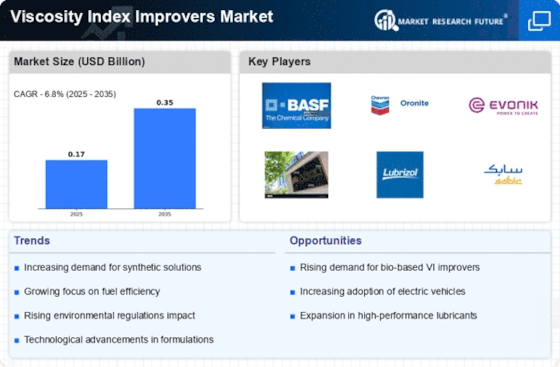Top Industry Leaders in the Viscosity Index Improvers Market

The VII market is poised for continued growth in the coming years, driven by rising demand for fuel-efficient lubricants and increasing industrial automation. The competitive landscape is dynamic, with established players and new entrants vying for market share. Companies that prioritize innovation, sustainability, and strategic partnerships are likely to succeed in this evolving market.
Strategies Fueling Market Share:
-
Product Innovation:Leading players like Infineum, Chevron Oronite, and Lubrizol invest heavily in R&D, pioneering new VIIs with superior shear stability, thermal resistance, and friction-reducing properties. Specialty blends catering to specific applications like heavy-duty engines or extreme temperatures create growth opportunities. -
Geographic Expansion:Emerging economies like China and India offer significant potential for VIIs due to booming vehicle ownership. Companies are establishing production facilities and partnerships to tap into these lucrative markets. -
Sustainability Focus:Environmental concerns drive the development of bio-based and biodegradable VIIs. BASF, for instance, partnered with Neste to produce an eco-friendly VII from renewable raw materials. -
Vertical Integration:Some players like Afton Chemical integrate backward by acquiring feedstock suppliers, securing stable supply chains and cost advantages. -
Mergers and Acquisitions:Consolidation has been a recurring theme, with major players like Infineum acquiring rivals to strengthen their portfolios and geographical reach.
Factors Influencing Market Share:
-
Technological Advancements:Innovations in fuel-efficient engines and extended oil drain intervals may reduce demand for traditional VIIs. Companies must adapt by developing VIIs suitable for these newer technologies. -
Regulations and Environmental Concerns:Stringent emission regulations and growing consumer demand for sustainable lubricants force companies to comply with stricter norms and invest in eco-friendly solutions. -
Fluctuations in Crude Oil Prices:Volatile crude oil prices can impact the cost of raw materials for VIIs, affecting production and influencing prices charged to consumers. -
Competitive Intensity:The presence of diverse established and emerging players, along with private label entrants, intensifies competition and pricing pressures.
Key Companies in the Viscosity Index Improvers market include
- Evonik Industries
- Lubrizol Corporation
- Chevron Oronite Company LLC
- Afton Chemical Corporation
- Infineum International Limite
- Sanyo Chemical Industries, Ltd.
- Nanjing Runyou Chemical Industry Additive Co., Ltd.
- Shenyang Great Wall Lubricating Oil Manufacturing Co., Ltd.
- Jilin Xingyun Chemical
- Shanghai High-Lube Additives
- Bariyan Oil & Lubricants Pvt. Ltd.
- BPT Chemicals Co, Ltd
- Brad-Chem Ltd
- Chetas Biochem
- Croda Lubricants
- Innov Oil
Recent News
Lubrizol introduced a range of Viscosity Index Improvers (VIIs) for automotive lubricants in April 2023, claiming better performance, such as improved oxidation and thermal stability.
In October 2022, Taiwanese material science company LCY Chemical Corp. showcased its thermoplastic elastomer portfolio at K 2022 as part of a broader commitment to sustainable materials science backed by global distribution networks.
Evonik signed a purchase agreement to acquire Swiss-based plant extracts producer Botanica with November closing expected; Botanica is Europe's leading provider of sustainable botanical extract solutions for the personal care industry, with sites in Switzerland, France and Germany.
Warren Buffet-led Lubrizol Corporation to invest USD 245m in setting up a Chlorinated Polyvinyl Chloride (CPVC) pipe manufacturing plant at Gujarat's Dahej industrial estate; new hot & cold water distribution pipes proposed in Gujarat are an alternative to traditional GI pipes used currently for residential & commercial projects.










